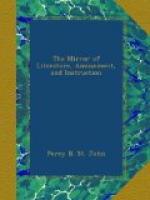But destruction to this terrestrial orb and its teeming inhabitants, may be more speedily brought about than by a concussion with these celestial agents. A single principle of motion annihilated, evaporation suspended, or a component part of the atmosphere abstracted, and “final ruin would drive her ploughshare o’er creation;” universal conflagration would instantly ensue from the separation of the oxygen from the nitrogen of the atmosphere,—the former exerting its native energies without control wherever it extends,—solid rocks, ponderous marble, metals, and even water itself, would burst into an intensity of flame, and change the aspect of all sublunary things.
But all these vast bodies of the universe are, doubtless, kept in their prescribed limits as with so many “reins and bridles,” and when this earth has completed its destined circles, and fulfilled the purposes for which it was called out of nothing, it will need but the command of the glorious Creator who at first spoke this beautiful frame into being, bliss, and light, to return it to its primeval gloom, or bid it shine forth with new resplendent beauty and lustre.
The “Notes of a Naturalist” are stated to be by Professor Rennie; but we question if they have been written expressly for this volume, as we recognise many passages from other works.
* * * * *
NOTES OF A READER.
SCOTTISH LITERARY DINNER.
As reported by Three Hands.
It is a miserable thing to quarrel or even differ over a dinner, although the whole affair be but a matter of taste. It is likewise a miserable thing to differ after dinner, since it lamentably disturbs the digestion of the food, as in this case it may the temper of the feeders. Yet respecting the dinner to celebrate the Birthday of Burns in Freemasons’ Hall, there is a remarkable difference among the critical craft; which difference, by the way, no shades of opinion can reconcile. As we were not of the party, (and we congratulate ourselves on the escape from a Scottish half-dinner,) it may be well to quote from three of the reports that have appeared, rather than let the affair pass unnoticed in our pages. We do so from a wish to preserve certain traits and anecdotes which the occasion drew forth,—to give the pleasant rather than the “untoward” events of the day: though we must own the whole appears to have been a very droll business, always excepting the semi-pransus.
We start with an extract from Dr. Granville’s Catechism of Health:—
Q. What should a dinner consist of?
A. Of any wholesome food that is in season, plainly dressed.
Q. Should the dinner be composed of many dishes?
A. The most wholesome dinner is that which consists of a single dish of meat, with a proper quantity of vegetables.




